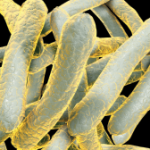This concept of microorganisms influencing health and disease via noninfectious pathways has caught the attention of the lay press. A recent article in The Economist predicted that, “looking at human beings as ecosystems that contain many collaborating and competing species could change the practice of medicine.”3 Writing in The New York Times, the author Moises Velasquez-Manoff takes this view one step further. In an op-ed piece published in August 2012, he argues that immune dysregulation is the root cause of autism and a host of other diseases.4 According to Velasquez-Manoff, “scientists have repeatedly observed that people living in environments that resemble our evolutionary past, full of microbes and parasites, don’t suffer from inflammatory diseases as frequently as we do.”
This is not a new idea; though “the hygiene hypothesis” was coined in 1989 by Professor David Strachan of the University of London as a way of explaining the higher incidence of asthma and allergic diseases in Western countries, the original theory should be credited to the prolific Russian zoologist, Elie Metchnikoff. His early work over a century ago described the process of phagocytosis, for which he was awarded the Nobel Prize in 1908. He also observed and reported on a population of Bulgarians who had an extremely long life expectancy, which he attributed to their high consumption of yogurt. Metchnikoff proposed the need for “good” microbiota to maintain harmony within the host. He practiced what he preached and purportedly drank sour milk every day as a way to increase his fecal lactic acid levels. Talk about being ahead of his time! Recent studies have confirmed that, in fact, elevated fecal concentrations of short-chain fatty acids may help reduce systemic inflammation.
Why We Are Not Gastroenterologists
Despite the growing popularity of fermented foods and probiotics as dietary constituents, treating specific diseases by dietary manipulation has met with little success. To date, efforts to treat rheumatoid arthritis or lupus in this way have failed. Perhaps dietary adjustments are incapable of manipulating the microbiome to the degree required to modulate disease. Here are two novel strategies that have shown efficacy: worms and fecal transplants. Helminths have been shown to diminish immune responsiveness in naturally colonized humans and reduce inflammation in experimental colitis. Crohn’s disease involves overreactive Th1 lymphocyte pathways, and helminths blunt Th1 responses.
In one clinical trial, patients with Crohn’s disease were treated by ingesting the microscopic eggs of the intestinal helminth, Trichuris suis.5 In humans, the eggs live for about two weeks, but during this brief period, they appear to influence the host immune system and prevent it from attacking host tissues. In the study, patients ingested 2,500 live T. suis ova every three weeks for 24 weeks, and about 80% of patients showed a clinical response, with nearly 75% achieving disease remission. There is now commercial support for developing this product as a novel immunomodulating agent. Given the favorable response noted in Crohn’s disease, will the spondylarthropathies be considered the next therapeutic target?


